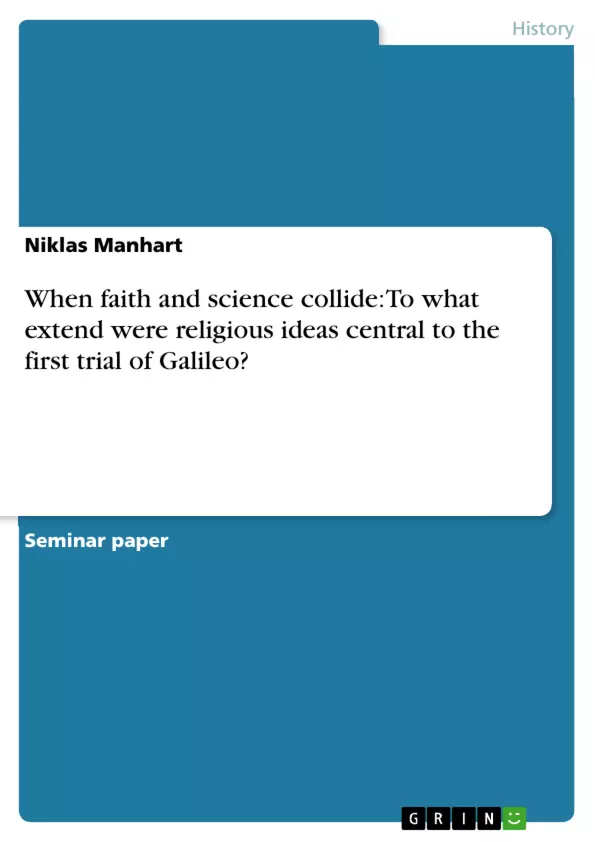Throughout the centuries, the condemnation of Galileo Galilei (1564-1642) by the Roman Inquisition has sparked a number of controversial interpretations. In this essay, I will try to assess if religious ideas were central to his first trial (roughly from
1611 to 1616), or whether personal grudges and ecclesiastical power politics were at the root of Galileo’s persecution.
Inhaltsverzeichnis (Table of Contents)
- When Faith and Science Collide: To What Extent Were Religious Ideas Central to the First Trial of Galileo?
- Galileo's Rise to Fame and the Copernican System
- The "Pigeon League" and the First Attacks on Galileo
- Castelli's Meeting and Galileo's Letter
- The Public Onslaught Against Galileo: Caccini's Attack and Lorini's Complaint
- Galileo's Journey to Rome and the Inquisition's Response
Zielsetzung und Themenschwerpunkte (Objectives and Key Themes)
This essay aims to investigate the extent to which religious ideas influenced Galileo Galilei's first trial in the early 17th century. The author examines whether Galileo's persecution stemmed from his scientific views or from personal rivalries and ecclesiastical power dynamics.
- The influence of religious ideas on the trial of Galileo
- The role of personal grudges and power politics in the persecution of Galileo
- The debate over the Copernican system and its compatibility with Scripture
- The clash between scientific inquiry and Church authority
- The impact of Galileo's personality and advocacy on the course of events
Zusammenfassung der Kapitel (Chapter Summaries)
The essay begins by outlining the controversy surrounding the condemnation of Galileo by the Roman Inquisition and the various interpretations it has sparked. It then introduces the specific context of Galileo's first trial, focusing on the accusations of heresy stemming from his support of Copernican views.
The second chapter examines Galileo's rise to fame following his astronomical discoveries and his subsequent advocacy for the Copernican system. It discusses his influence in high ecclesiastical circles and his contentious personality, which led to conflicts with adversaries in Florence.
The third chapter focuses on the "Pigeon League," a group of Dominican theologians who opposed Galileo's views. The chapter details the initial attacks on Galileo, including a public denouncement from the pulpit and a complaint filed with the Inquisition.
The fourth chapter explores the meeting between Galileo's friend Castelli and the Medici court, which sparked a heated debate about the compatibility of Scripture and heliocentric theory. It highlights Galileo's controversial letter to Castelli, in which he argues for the fallibility of Scripture interpretation.
The fifth chapter delves into the public onslaught against Galileo, triggered by Tommaso Caccini's attack from the pulpit in Florence. It examines the motivations behind Caccini's actions and the role of Niccolò Lorini in escalating the controversy through a complaint to the Inquisition in Rome.
The final chapter summarizes Galileo's journey to Rome to defend himself and the Inquisition's response. It concludes with a discussion of the various factors that contributed to the escalating nature of the trial.
Schlüsselwörter (Keywords)
Galileo Galilei, Copernicanism, Roman Inquisition, heliocentric theory, religious ideas, Scripture, scientific inquiry, Church authority, personal grudges, power politics, Aristotelian philosophy, Dominican theologians, "Pigeon League," Castelli's letter, Caccini's attack, Lorini's complaint, Galileo's trial.
Frequently Asked Questions
Were religious ideas central to Galileo's first trial?
This essay investigates whether the trial was truly about religious doctrine or if personal grudges and ecclesiastical power politics were the primary drivers.
What was the "Pigeon League"?
The "Pigeon League" was a group of Dominican theologians and adversaries in Florence who actively opposed Galileo's Copernican views.
What role did the Copernican system play in the trial?
Galileo's support for the heliocentric theory was seen as a challenge to the literal interpretation of Scripture, leading to accusations of heresy.
Who were Galileo's main accusers during this period?
Key figures included Tommaso Caccini, who attacked him from the pulpit, and Niccolò Lorini, who filed a complaint with the Inquisition.
What was Galileo's argument regarding Scripture?
In his letter to Castelli, Galileo argued that while Scripture is infallible, its interpreters are not, especially when it comes to scientific matters.
- Arbeit zitieren
- M.A. Niklas Manhart (Autor:in), 2009, When faith and science collide: To what extend were religious ideas central to the first trial of Galileo?, München, GRIN Verlag, https://www.grin.com/document/189687



